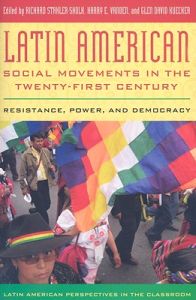
1 säljare
Latin American Social Movements in the Twenty-First Century
When elected civilians replaced military authoritarian regimes in Latin America in the 1980s, democracy seemed at hand. Yet those nominally democratic regimes implemented widely unpopular neoliberal policies, opening the economies to global market forces with devastating impact on the poor. This clearly written and comprehensive text examines the uprising of politically and economically marginalized groups in Latin American societies. Specialists in a broad range of disciplines interpret the new wave of social movements, including movements in Mexico, Ecuador, Bolivia, Brazil, Colombia, Chile, and Argentina, the Via Campesina global peasant network, and Mesoamerican coalitions against regional free trade agreements. This volume assembles original research from a variety of case studies in a student-friendly format. Section introductions help students contextualize the essays, highlighting social movement origins, strategies, and outcomes.Thematic sections address historical context, political economy, community-building and consciousness, ethnicity and race, gender, movement strategies, and transnational organizing, making this book useful to anyone studying the wide range of social movements in Latin America.
Utgiven: 2008
ISBN: 9780742556478
Förlag: Rowman & Littlefield Publishers
Format: Häftad
Språk: Engelska
Sidor: 404 st
When elected civilians replaced military authoritarian regimes in Latin America in the 1980s, democracy seemed at hand. Yet those nominally democratic regimes implemented widely unpopular neoliberal policies, opening the economies to global market forces with devastating impact on the poor. This clearly written and comprehensive text examines the uprising of politically and economically marginalized groups in Latin American societies. Specialists in a broad range of disciplines interpret the new wave of social movements, including movements in Mexico, Ecuador, Bolivia, Brazil, Colombia, Chile, and Argentina, the Via Campesina global peasant network, and Mesoamerican coalitions against regional free trade agreements. This volume assembles original research from a variety of case studies in a student-friendly format. Section introductions help students contextualize the essays, highlighting social movement origins, strategies, and outcomes.Thematic sections address historical context, political economy, community-building and consciousness, ethnicity and race, gender, movement strategies, and transnational organizing, making this book useful to anyone studying the wide range of social movements in Latin America.
Begagnad bok
499 kr
Fri frakt & skickas inom 1-3 vardagar
Köpskydd med Studentapan
Varje köp täcks av Studentapans köpskydd som säkerställer att boken kommer fram, att du får rätt bok och att skicket stämmer överens med beskrivning.



